The Tamil Nadu Public Service Commission (TNPSC) conducts the Group 1 exam to recruit candidates for prestigious posts like Deputy Collector, DSP, Assistant Commissioner, and District Registrar.
To crack this highly competitive exam, it is essential to have a clear understanding of the TNPSC Group 1 Syllabus 2026 and the detailed Prelims & Mains exam pattern. Knowing the subject-wise topics, marking scheme, and weightage will help aspirants prepare strategically and boost their chances of success.
TNPSC Group 1 Syllabus And Exam Pattern 2026
Success in the TNPSC Group 1 Exam 2026 depends on smart and consistent preparation, as both the Prelims and Mains follow the official syllabus. A clear grasp of the exam pattern, subject-wise topics, and weightage will streamline your study plan. With regular practice and timely revision, you can build confidence, sharpen accuracy, and boost your chances of cracking this prestigious exam.
| TNPSC Group 1 Syllabus 2026 For Prelims And Mains: Key Highlights | |
|---|---|
| Name of Organization | Tamil Nadu Public Service Commission |
| Category | Syllabus |
| Stages | Three stages (Prelims, Mains, Interview) |
| Examination Duration | 3 hours for each paper in Prelims and Mains |
| Examination Mode | Offline |
| Total Marks |
|
| Notification Date | 23 June 2026 |
| TNPSC Group 1 Prelims exam date | 06 September 2026 |
| Job Location | Tamil Nadu |
| Official Website | tnpsc.gov.in |
TNPSC Group 1 Syllabus 2026 For Prelims Exam
The TNPSC Group 1 Prelims syllabus covers General Studies (degree level) and Aptitude & Mental Ability (SSLC level). A section-wise breakdown is provided below.
| TNPSC Group 1 Syllabus 2026 For Prelims Exam | |||
| Part | Units | Topics Covered | No. of Questions |
| Part A: General Studies (Degree Standard) | Unit I: General Science | Scientific knowledge and temper, reasoning, science applications, mechanics, physics, chemistry, life sciences, environment, ecology, inventions, current affairs. | 10 |
| Unit II: Geography of India | Location, physical features, climate, water resources, natural resources, forest and wildlife, agriculture, transport, social geography, natural calamities, disaster management, environmental pollution, climate change, green energy, geographical landmarks, current affairs. | 10 | |
| Unit III: History, Culture of India, and Indian National Movement | Indus Valley Civilization, major dynasties, socio-cultural history, national renaissance, freedom movement, leaders, communalism, partition, Indian culture, unity in diversity, secularism, social harmony, personalities, national symbols, sports, books & authors, current affairs. | 25 | |
| Unit IV: Indian Polity | Constitution, preamble, salient features, union & state government structure, citizenship, fundamental rights, directive principles, executive, judiciary, federalism, elections, anti-corruption measures, Lokpal, Lokayukta, RTI, women’s empowerment, consumer protection, political parties, current affairs. | 40 | |
| Unit V: Indian Economy and Development Administration in Tamil Nadu | Nature of Indian economy, five-year plans, Planning Commission & NITI Aayog, RBI, fiscal & monetary policy, Finance Commission, taxation, employment, land reforms, agriculture, industrial growth, rural development, social problems (population, health, education). | 50 | |
| Unit VI: History, Culture, Heritage, and Socio-Political Movements in Tamil Nadu (40 Questions) | History of Tamil Society, related archaeological discoveries, Tamil literature from the Sangam age till contemporary times
Thirukkural – Significance as a secular literature – Relevance to everyday life, Impact of Thirukkural on humanity, Thirukkural and universal values – Relevance to socio-political economic affairs, Philosophical content in Thirukkural |
40 | |
|
Part B: Aptitude and Mental Ability (SSLC Standard)
|
Basic quantitative aptitude, logical reasoning (10), numerical ability, data interpretation, problem-solving (15). | 25 | |
| Total | 200 Questions | ||
TNPSC Group 1 Syllabus 2026 Mains Exam
The TNPSC Group 1 Mains includes four 3-hour papers with conceptual and descriptive questions. Unlike UPSC Mains, it has no optional subjects. Check the detailed syllabus below.
| TNPSC Group 1 Syllabus 2026 For Mains Exam | |||
| Paper | Subjects | Topics Covered | Marks |
| Paper I | Compulsory Tamil Language Test (10th Standard Level) | Translation (Tamil-English & English-Tamil), précis writing, comprehension, essay from Thirukkural, letter writing, Tamil language proficiency, socio-economic development of Tamil Nadu, social justice, reservation policies, and the role of social reform movements. | 100 |
| Paper II | General Studies – I | Modern history of India and Indian culture, social issues in India and Tamil Nadu, general aptitude & mental ability. | 250 |
| Paper III | General Studies – II | Indian polity and emerging political trends, role and impact of science & technology in India, Tamil society and its cultural heritage. | 250 |
| Paper IV | General Studies – III | Indian economy, planning, rural development, industry, agriculture, geography of India with special reference to Tamil Nadu, biodiversity, and disaster management. | 250 |
| Interview | Oral Test | Personality test and interview. | 100 |
| Total | 1000 Marks | ||
Syllabus For Mains Exam (Paper I)
The detailed TNPSC group 1 syllabus for the main exam is given below , and candidates can review each section carefully before starting their preparation.
தாள் I – கட்டாயத் தமிழ் மொழித் தகுதி தேர்வு
(புத்தகம் வகுப்புப் தரம் – 100 மதிப்பெண்கள் – விரிந்தவிடத்துக்கும் வகை)
தேர்வு திட்டம்
-
மொழிப்பயர்த்தல்: தமிழிலிருந்து ஆங்கிலத்துக்கு மொழிப்பயர்த்தல், ஆங்கிலத்திலிருந்து தமிழுக்கு மொழிப்பயர்த்தல்
-
சுருக்கம் வரைத்தல்
-
பொருள் உணர்த்தல்
-
சுருக்கக் குறிப்பிலிருந்து விரிந்தமாகக் குறிப்பிடல்
-
திருக்குறள் தொடர்பான கட்டுரை வரைவது
-
கட்டுரை வரைத்தல் (அவசியம் சார்ந்தது)
-
தமிழ் மொழி அறிவு
பாடத்திட்டம்
-
தற்கால நிலைவுகள்
-
சமூகநாய் பிரச்சனைகள்
-
சுற்றுச்சூழல் தொடர்பான தலைப்புகள்
-
இந்தியப் பொருளாதாரம் தொடர்பான தலைப்புகள்
-
அறிவியல் தொழில்நுட்பமும்
-
கலையும் பண்பாடும்
-
பத்திரிகை இலக்கியங்கள்
-
திரைப்படம் – இசை
-
சுவாமி விவேகானந்தர்
-
இக்காலத் தமிழ் மொழிக் கண்ணோட்டம்
-
வழக்குச் மன்றம் (நீதித்துறை) தொடர்பான தலைப்புகள்
-
தமிழர்களின் சமூக பொருளாதார வரலாற்று பார்வை (பெண்கள், விவசாயத்திற்கும்)
-
சமூக நலத்திட்டங்கள்
-
இட ஒதுக்கீட்டுத் திட்டம்
-
சமூக நீதி மற்றும் மாநிலத்தின் பொருளாதார நிலை
-
வங்கிகள் (நிதி அமைப்புகள்)
-
மின் தகவல் தொடர்பு வளர்ச்சி
-
தகவல் தொழில்நுட்ப வளர்ச்சி
-
மகளிர் கல்வி மற்றும் வேலைவாய்ப்பு
-
மொழிகளின் பயன்பாடு
-
கல்வி வளர்ச்சி
-
எழுத்து, பொருள் வேறுபாடு
-
பிரித்தானிய ஆட்சியின் விளைவுகள்
-
கல்வித் துறையின் வளர்ச்சி
-
அரசியல் வளர்ச்சி
-
இலக்கிய முன்னோடிகள் மற்றும் இலக்கிய வரலாறு
-
வரலாறு தொடர்பான முக்கிய தலைப்புகள்
-
தமிழக அரசியல் வளர்ச்சி
-
அரசு அலுவலர்களின் அடிப்படைத் தேர்வுத் தமிழ் தேர்வுத் திட்டம்
-
பத்திரிகை தொடர்பான தகவல்கள்
-
திருக்குறள் தொடர்பான அறிவியல் மற்றும் சமூக நெறிகள்
இந்த பாடத்திட்டம் தமிழ்மொழியில் திறன் பரிசோதனைக்கான அடிப்படையாகும்.
Paper II – General Studies I (Degree Standard – 250 Marks)
Unit I: Modern History of India and Indian Culture (100 marks)
- Advent of Europeans – Colonialism and imperialism – Establishment, expansion and consolidation of British Rule Early uprisings against British Rule – South Indian rebellion (1799 – 1801 A.D.) – Vellore rebellion (1806 A.D.) – Sepoy mutiny (1857 A.D.)
- Indian National Movements – Moderation, Extremism, and Terrorism Movements of Indian Patriotism
- Significant Indian National Leaders – Rabindranath Tagore, Maulana Abul Kalam Azad, Mohandas Karamchand Gandhi, Jawaharlal Nehru, Subhas Chandra Bose, B.R. Ambedkar, and Vallabhai Patel. Constitutional developments in India from 1773 to 1950 Second World War, and the final phase of the independence struggle
- Partition of India – Role of Tamil Nadu in the freedom struggle. Contributions of Tamil Nadu leaders: Subramaniya Bharathi, V.O. Chidambaranar, C. Rajagopalachariar, Thanthai Periyar, Kamarajar, and others
- Impact of British rule on socio-economic affairs – National Renaissance Movement – Socio-religious reform movements Social reform and educational reform acts
- Emergence of “Social Justice” Ideology in Tamil Nadu – Origin, Growth, Decay, and achievements of the Justice Party Socio-political movements and their achievements after Independence
- Salient features of Indian culture: Unity in diversity – Race – Language – Religion, Customs, and Rituals
- India as a Secular State – Organizations for Fine Arts, Dance, Drama, and Music – Cultural Panorama National Symbols
- Eminent personalities in cultural fields, and the Latest historical research developments in Tamil Nadu
Unit II: Social Issues in India and Tamil Nadu (100 marks)
- Population Explosion – Fertility, Mortality – Population Control Programmes – Migration – Poverty – Illiteracy – Dropouts – Right to Education, Women Education – Skill-based education and programmes – E-Learning
- Child labour and Child abuse – Child Education – Child school dropouts – Child abuse – Laws to protect Child abuse – Child protection and welfare schemes
- Sanitation: Rural and Urban Sanitation – Role of Panchayat Raj and Urban development agencies in sanitation schemes and programmes
- Women Empowerment: Social justice for women – Schemes and programmes – Domestic violence – Dowry menace – Sexual assault – Laws and awareness programmes – Prevention of violence against women
- Role of Government and NGOs in women empowerment – Schemes and Programmes Social Changes: Urbanization – Policy, Planning, and Programmes in India and Tamil Nadu – Comparative study on social and economic indicators – Impact of violence on society
- Religious violence – Terrorism and Communal violence – Causes – Steps to control and awareness, Problems of minorities – Human rights issues – Regional disparities in India – Causes and remedies
- Social development: Approaches – Models – Policies and programmes – Linkage between education and social development – Community development programmes Self-employment and entrepreneurship development – Role of NGOs in social development
- Education – Health and human development – Health care problems in India – Children, Adolescents, Women, and the Aged – Health Policy in India – Schemes – Health Care Programmes in India
- Vulnerable sections of the population: Problems – Laws and punishments, Various welfare programmes for vulnerable sections by the State, Central Government, and NGOs, Current Affairs
Unit III: Ethics and Integrity (50 marks)
- Ethics and Human Interface: Definition and scope of ethics – Ethics of Indian Schools of Philosophy – Ethics of Thirukkural
- Kinds of ethics: Intuitionism – Existentialism – Duties and responsibility – Moral judgements – Moral Absolutism – Moral Obligation
- Attitude: Its influence and relation with thought and behaviour – Moral and political attitudes
- Ethics in public administration: Philosophical basis of governance and probity in Governance
- Codes of ethics and conduct: Primary responsibilities of public service professionals – Transparency of information sharing and service delivery, Professional and non-professional interaction – Potentially beneficial interaction, Maintenance of confidentiality of records – Disclosure of Information – Boundaries of competence – Consultation on ethical obligation, Ethics and Non-discrimination – Citizens’ Charters – Challenges of corruption – Ethics of public policy determination.
Paper III – General Studies II (Degree Standard – 250 Marks)
Unit I: Indian Polity and Emerging Political Trends across the World affecting India (100 marks)
- Constitution of India – Historical background – Making of the Indian Constitution – Preamble – Salient features of the Indian Constitution
- Parts, Articles, and Schedules – Amendments; Citizenship; Fundamental Rights and Fundamental Duties
- Directive Principles of State Policy; Structure, Power and Functions of Governments: Union Government
- Legislature: Parliament – Lok Sabha and Rajya Sabha; Executive: President, Vice-President, Prime Minister, and Council of Ministers – Constitutional Authorities
- Judiciary: Supreme Court – Judicial Review – Judicial Activism – Latest Verdicts
- State Government – Legislature: State Legislative Assembly – State Legislative Council; Executive: Governor – Chief Minister – Council of Ministers
- Judiciary: High Court – District Courts – Subordinate Courts – Tribunals
- Local Government: Rural and Urban Local Governments – Historical background – 73rd and 74th Constitutional Amendment Acts
- Union Territories: Evolution – Administration; Federalism: Indian Federal System – Differentiating from other forms of federalism
- Union – State Relations: Legislative, Administrative, and Financial Relations
- Indian Administration: Civil Services in India – Historical background – Classification of Civil Services – Central and State Services – Recruitment and Training
- Political Parties: National and Regional – Pressure groups – Public opinion – Mass Media – Social Media – Non-Governmental Organizations (NGOs)
- Administrative Reforms: Central Vigilance Commission – Anti-Corruption measures – Lokadalat – Lokayukta – Lokpal – Ombudsman in India – RTI Act
- Citizens’ Grievances and Administrative Reform Commission – Administrative Tribunals
- Profile of Indian States: Demography – State Language – Developmental Programmes – e-governance
- India and World: India’s foreign policy – India’s relationship with world countries – Defence and National Security – Nuclear Policy – Terrorism – Human Rights and Environmental issues – International Organisations – Pacts and Summits
- Current Affairs
Unit II: Role and Impact of Science and Technology in the Development of India (100 marks)
- Science and Technology – Role, Achievements and Developments – their applications and impacts
- Elements and Compounds, Acids, Bases, and Salts – Oxidation and reduction – Carbon, Nitrogen, and their compounds
- Chemistry of Ores and Metals – Fertilizers, Pesticides, Insecticides – Polymer and Plastics – Corrosion – Chemistry in everyday life
- Energy – Renewable and Non-Renewable – Self-sufficiency – Oil and Minerals exploration
- Space Research – Nano Science and Technology – Application of Nano-materials
- Information Technology – Robotics and Automation – Artificial Intelligence – Mobile and Wireless Technology
- Current Affairs
Unit III: Tamil Society – Culture and Heritage (50 marks)
(Candidates may answer the questions in this unit either in Tamil or in English)
- Origin and Development of Tamilian – Palmleaf Manuscript – Document – Archaeological excavation in Tamil Nadu – Adhichanallur, Arikamedu, Keeladi, Konthakai, Manalur, Sivakalai
- Arts, Science, and Culture: Literature, Music, Drama, and other arts – Science – Culture (Internal and External)
- Tamil Society and the condition of business – Sangam age – Medieval age – Modern age
- Growth of Rationalism – Origin and Development of Dravidian Movements in Tamil Nadu – Their contribution to socio-economic development
- Socio-cultural life of the modern Tamilian
- Tamil Diaspora – Development of modern Tamils: Print – Edition – Translation – Film Industries – Computer and Media
Paper IV – General Studies III (Degree Standard – 250 Marks)
Unit I: General Geography and Geography of India with Special Reference to Tamil Nadu (75 marks)
- Earth and Universe: Solar System – Atmosphere, Lithosphere, Hydrosphere, and Biosphere
- India and Tamil Nadu: Location – Physical Divisions – Drainage – Weather and Climate: Monsoon, Rainfall
- Natural Resources: Soil, Natural Vegetation, Wildlife – Irrigation and Multipurpose Projects – Mineral Resources – Energy Resources
- Agriculture: Crops, Livestock, Fisheries, Agricultural Revolutions
- Industries – Population: Growth, Distribution, and Density – Migration: Races, Tribes, Linguistics, and Religions
- Trade – Geo Politics: Border Disputes; Ocean and Sea: Bottom relief features of the Indian Ocean, the Arabian Sea, and the Bay of Bengal
- Geospatial Technology: Remote Sensing, Geographical Information System (GIS), and Global Navigation Satellite System (GNSS)
- Map: Locating Features and Places
- Current Affairs
Unit II: Environment, Biodiversity, and Disaster Management (75 marks)
- Ecology: Structure and function of ecosystem – Ecological succession – Ecosystem services
- Biodiversity conservation – Biodiversity Types – Biodiversity Hot Spots in India
- Biodiversity: Significance and Threats – In-situ and Ex-situ conservation measures
- Roles of the Convention on International Trade in Endangered Species of Wild Fauna and Flora (CITES), the International Union for Conservation of Nature (IUCN), and the Convention on Biological Diversity (CBD) – Biodiversity Act
- Environmental Pollution and Management: Air, Water, Soil, Thermal, and Noise pollution – Pollution Prevention and control strategies
- Solid and hazardous waste management – Environmental Standards and Environmental Monitoring
- Environmental Impact Assessment (EIA): Steps in the EIA process – Environmental Clearance – Environmental Auditing
- Sustainable Development: Global Environmental Issues and Management – Sustainable Development Goals (SDGs) and Targets – Climate Change – Changes in monsoon pattern in Tamil Nadu, India, and the Global scenario
- Environmental consequences of climate change and mitigation measures – Clean and Green Energy – Paris Agreement – Nationally Determined Contributions (NDCs)
- Environmental Laws, Policies, and Treaties in India and the Global Scenario
- Natural Calamities, Manmade Disasters – Disaster Management and National Disaster Management Authority – Sendai Framework for Disaster Risk Reduction
- Environmental Health and Sanitation
- Current Affairs
Unit III: Indian Economy – Current Economic Trends and Impact of Global Economy on India (100 marks)
- Features of Indian Economy – National Income – Capital formation – NEP (New Economic Policy) – NITI Aayog (National Institution for Transforming India)
- Agriculture – Role of Agriculture – Land Reforms – New Agricultural Strategy – Green Revolution – Contract Farming – Minimum Support Price – Price Policy
- Public Distribution System (PDS), Subsidy, Food Security – Agricultural Marketing, Crop Insurance, Labour – Rural Credit and Indebtedness – World Trade Organization and Agriculture
- Industry: Growth – Policy – Role of Public Sector and Disinvestment – Privatisation and Liberalization – Public Private Partnership (PPP) – SEZs (Special Economic Zones) – MSMEs (Micro, Small and Medium Enterprises)
- Infrastructure: Transport, Communication, Energy, Ports, Roads, Airports, Railways, Urbanisation, and Smart Cities
- Banking, Money, and Financial Markets – Financial Inclusion – RBI – Monetary Policy – Fiscal Policy – Budgeting and Public Finance – Foreign Exchange Management
- Sources of Revenue – Tax and Non-Tax Revenue – Canons of Taxation – Goods and Services Tax
- Public Expenditure – Fiscal Policy – Public Debt – Finance Commission – Fiscal Federalism; Issues in the Indian Economy – Poverty and Inequality
- Poverty alleviation programmes – Mahatma Gandhi National Rural Employment Guarantee Act – New Welfare Programmes for Rural Poverty Unemployment, Gender inequality
- Inflation – Inflation targeting – Deflation – Sustainable Economic Growth
- India’s Foreign Trade – Balance of Payment, Export-Import Policy, Foreign Exchange Market, Foreign Direct Investment
- Globalization – Global Economic Crisis – Impact on Indian Economy; International Institutions – IMF (International Monetary Fund) – World Bank – BRICS (Brazil, Russia, India, China, and South Africa) – SAARC (South Asian Association for Regional Co-operation) – ASEAN (Association of South East Asian Nations).
- Tamil Nadu Economy and Issues – Gross State Domestic Product – Trends in State’s Economic Growth – Demographic Profile of Tamil Nadu – Agriculture – Contract Farming
- Tamil Nadu State Policy on Promotion of Organic Farming – Industry and Entrepreneurship Development in Tamil Nadu – Infrastructure – Power, Transportation systems – Tourism – Health – Eco-tourism – Social Infrastructure – Self Help Groups and Rural women empowerment – Rural Poverty and Unemployment – Regional economic disparities – Local Government – Recent Government welfare programmes; Current Affairs.
TNPSC Group 1 Exam Pattern 2026
The TNPSC Group 1 Exam has three stages—Prelims, Mains, and Interview. Candidates must clear both written exams to qualify for the next round. Check the table below for minimum qualifying marks. Knowing the cut-offs and exam pattern is key to effective preparation and success.
| Subject | Duration | Maximum marks | Minimum Qualifying Marks (For SCs,SC(A)s, STs,MBCs /DCs, BC(OBCM)s and BCMs) |
Minimum Qualifying Marks (Others) |
| Preliminary Exam | 3 hours | 300 | 90 | 120 |
| Mains Exam: Paper-I | 3 hours | 100 | 40 | 40 |
| Mains Exam: Paper-II | 3 hours | 250 | 255 | 340 |
| Mains Exam: Paper-III | 3 hours | 250 | ||
| Mains Exam: Paper-IV | 3 hours | 250 | ||
| Interview | No fixed duration | 100 | Not Defined | |
TNPSC Group 1 Exam Pattern For Prelims 2026
Candidates can refer to the table below to check the exam pattern of TNPSC Group 1 for the preliminary exam.
- The Preliminary Exam consists of 200 MCQs, each worth 1.5 marks, with a total duration of 3 hours. There is no negative marking for incorrect answers, and the exam is qualifying only, with the marks not counting toward the final selection. The question paper will be available in both English and Tamil.
| Subject | Number of Questions | Total marks | Duration of exam |
| General Studies (Degree Standard) | 175 | 300 | 3 hours |
| Aptitude & Mental Ability Test (SSLC Standard) | 25 | ||
| Total | 200 |
TNPSC Group 1 Exam Pattern For Mains 2026
Candidates can refer to the table below to check the exam pattern of TNPSC Group 1 for the Mains Exam.
| Subject | Total Marks | Duration of exam |
| Paper-I Tamil Eligibility Test (SSLC Standard) (Descriptive Type) | 100 | 3 hours |
| General Studies (Degree Standard) (Descriptive type) | ||
| Paper II | 250 | 3 hours |
| Paper III | 250 | 3 hours |
| Paper IV | 250 | 3 hours |
| Total | 750 | |
TNPSC Group 1 Interview
The TNPSC Group 1 exam comprises several stages, with the final stage being a Personal Interview worth 100 marks. To reach this stage, candidates must first clear both the Preliminary and Main exams. The interview assesses awareness of current affairs, general knowledge, and personal background. Staying informed on local, national, and global issues, along with understanding the responsibilities of a state civil servant, is key to performing well.
| Also check | |
| TNPSC Annual Planner 2026 | TNPSC Group 1 Mock Test |
| TNPSC Group 1 Online Coaching 2026 | TNPSC Group 1 Previous Year Papers |
| TNPSC Group 1 Salary |
|



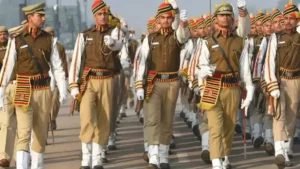 Gujarat Police Recruitment 2025 Notifica...
Gujarat Police Recruitment 2025 Notifica...
 GSSSB Fireman Driver Recruitment 2025 No...
GSSSB Fireman Driver Recruitment 2025 No...
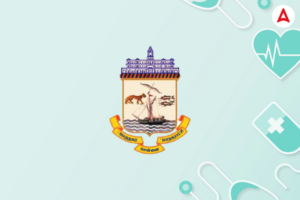 Chennai Corporation Recruitment 2026 Not...
Chennai Corporation Recruitment 2026 Not...
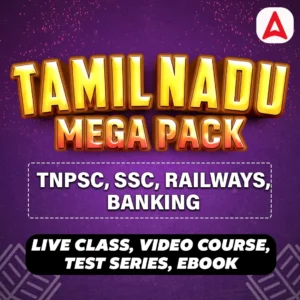
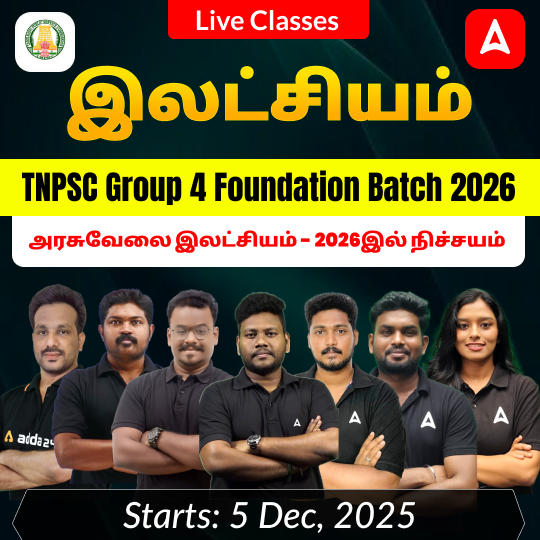
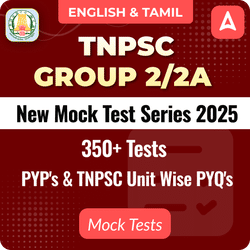
 Adda247 Job portal has complete information about all Sarkari Jobs and Naukri Alerts, its latest recruitment notifications, from all state and national level jobs and their updates.
Adda247 Job portal has complete information about all Sarkari Jobs and Naukri Alerts, its latest recruitment notifications, from all state and national level jobs and their updates.



